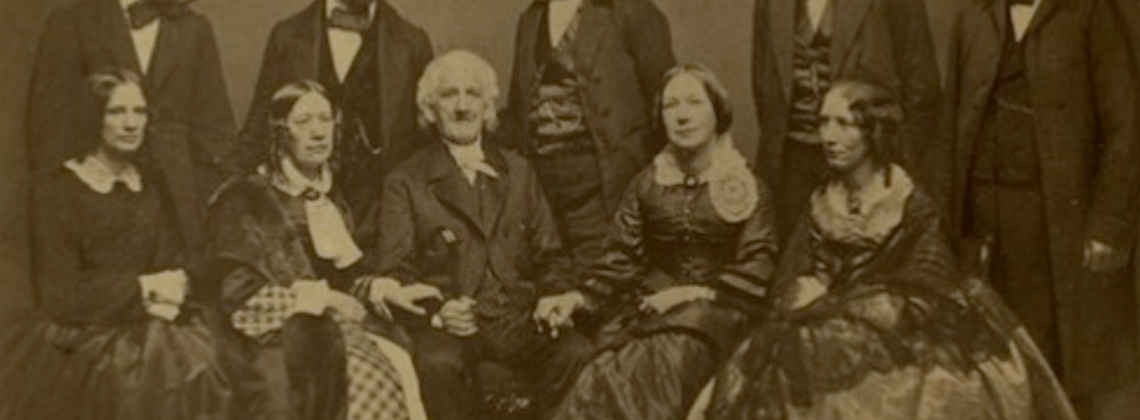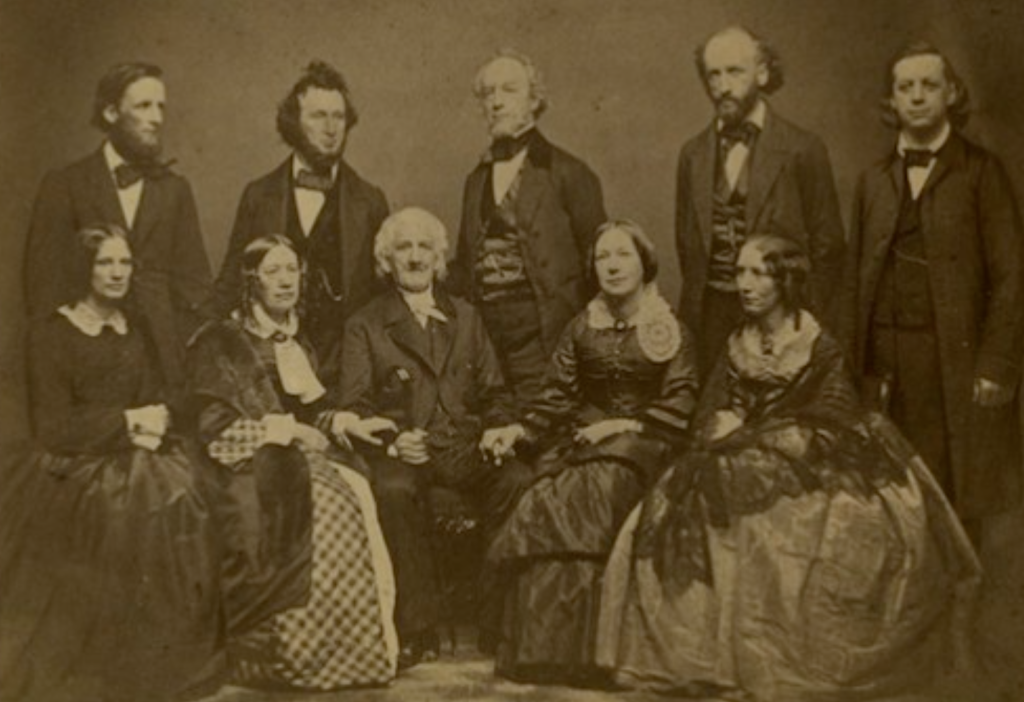

America’s ‘most influential family’ had troubles familiar to most of us today
The Beechers: America’s Most Influential Family by Obbie Tyler Todd. LSU Press, 2024. 368 pp., $39.95
At the beginning of the nineteenth century the nation’s aging founders were questioning the viability of the experiment in self-governance. By the century’s end the country exuded influence and controlled the continent from the Atlantic seaboard to colonial holdings in the Pacific. But in-between were the westward expansion and Native American removal, technological innovations and industrialization, immigration and nativism, the sectional crisis over the expansion of slavery, and the Civil War and Reconstruction. In his latest book, The Beechers: America’s Most Influential Family, historian Obbie Tyler Todd tells the story of this tumultuous century through one famous family of reformers.
When considering their diverse religious beliefs and broad social activism, one wonders what united this family, whose members championed an array of causes that included temperance, antislavery, education, and an expansion of rights for Native Americans, Blacks, and women. Todd’s answer: Beecherism, a “reformist gene” tethered to an unwavering belief in the power of the individual, the importance of family, and Christian republicanism—meaning, the conviction that evangelical values were in the best interest of the nation. This was the glue that bonded the family together and secured their enduring legacy.
Born in 1775, family patriarch Lyman Beecher played a pivotal role in the upbringing of his children following the untimely deaths of both his first wife, Roxana, and second wife, Harriet. He was a revivalist, pastor, and later president of Lane Seminary and was dedicated to promoting evangelical values. Above all, he believed that reform, both individual and national, began in the home. Over time reform became “family business.” This was a period of general optimism in human progress, encouraged by such technological innovations as the railroad, steamship, telegraph, penny press, and cotton gin. The optimistic anthropology that resulted captured the imagination and hopes of Lyman Beecher who, like many of his contemporaries, cast off the Puritan belief in human inability in favor of a firm confidence in an individual’s freedom to make decisions. Yet for Lyman and his children, individuals were not simply free to act. They bore a responsibility to act for the common good.
In the decades after the American Revolution and Louisiana Purchase, hundreds of thousands of American settlers had moved West into lands long claimed and controlled by Native Americans. The struggle for land, independence, and profit meant that these migrants would play a central role in the battle over the future of the nation and the ideals by which it would be defined. Lyman foresaw this coming struggle. In 1832 he uprooted his family from their New England home to head for the frontier—or, rather, what he believed would become America’s next great city, Cincinnati. There, on the edge of the free state of Ohio and within sight of slaveholding Kentucky, Lyman assumed the presidency of newly established Lane Seminary.
This battlefield of the West proved costly for the Beechers. In 1834, Lyman’s failure to embrace the abolitionist position—assumed by a majority of the student body in the wake of Lane Seminary’s famous “debates”—exposed his moderate antislavery views and brought the institution to its knees. A year later he found himself on trial for heresy. Although he was acquitted, the ordeal damaged his reputation and caused the Beecher children to distance themselves from their father’s conservatism and Calvinism. Instead, they embraced more radical antislavery views and “a lifelong distrust for dogmatic Christianity.” Indeed, just two years later, when the schism of 1837 split the Presbyterian Church into two camps, Old School and New School, the Beechers cemented their break with the Puritanism of their upbringing. Rejecting orthodoxy for orthopraxy by the mid-century mark, family members preferred to champion educational reform and abolitionism instead of entangling themselves with theological debates.
In the years leading up to secession and Civil War, two of Lyman’s children, Henry and Harriet, rose to prominence as staunch abolitionists. Moral suasion or basic moralism, instead of theological arguments or legislative action, was the family creed as they sought to confront the evils of slavery—Harriet through her best-selling antislavery novel Uncle Tom’s Cabin, and Henry through holding reverse slave auctions at Plymouth Church. Both also pursued more radical measures to achieve their ends. Harriet was active in the Underground Railroad that sought to undermine the nation’s new Fugitive Slave Act, while Henry famously helped to purchase Sharps carbines, later dubbed “Beecher’s Bibles,” for the frontier war over slavery that was taking place in Kansas. As Henry and Harriet took these leading roles in the growing antislavery movement in the North, it would not be an overstatement to say that in the years before the Civil War they became the most hated northerners in the white South.
During the Civil War and in the immediate postwar years, the Beecher children, untethered from their father’s Calvinism, promoted the Victorian values of “social responsibility, strict personal morality, education, order, and domesticity.” During the war, which coincided with the death of Lyman, the Beecher family found a variety of ways to get behind the Union war effort. Harriet and Isabella famously met President Abraham Lincoln at the White House in 1862, while Henry voiced his support for the president and for emancipation from his pulpit in New York. Not to be outdone by his more famous family members, half-brother James joined the army and later led a Black regiment in combat.
After the war, northerners and freed people both looked toward a brighter future marked by a restored republic and greater rights. During these years, the conservative reformer Catherine Beecher championed advanced education and economic independence for women, while Henry served as president of the Equal Rights Association and later the American Woman Suffrage Association. These pivotal years also saw Henry, the family’s most prominent member, embroiled in a scandal.
In 1872, the affair between congregant Elizabeth Tilton, wife of Theodore Tilton, and Henry was brought to light by the eccentric feminist crusader, Victoria Woodhull, who relished the opportunity to expose America’s most famous pastor as a fornicator who failed to live up to the Victorian values he espoused. The explosive news not only irreparably broke the Tilton marriage, it also split the Beecher family. Some family members were unable to square Henry’s actions with the long-held Beecher belief that family was sacrosanct. Despite Henry’s exoneration in multiple trials, the scandal forever damaged his reputation and undermined the “socially minded faith” he had sought to embody for the nation as “the most reliable guide to virtuous living.”
As the nineteenth century drew to a close, the nation’s most famous family of reformers struggled with the sorts of demons Lyman had railed against all his life. Licentiousness and immorality had ruined Henry’s reputation, intemperance claimed Harriet’s son, Fred, while her other son, Charley, embraced Unitarianism. Amid these trying times, charity held the family together. They found comfort and grace in each other’s presence, especially as each member of the Beecher family faced his or her own mortality, starting with Catherine in 1878 and concluding with Isabella in 1907.
The great strength of Todd’s account is his use of “Beecherism” as the substance that unified the family during its reformist work for myriad causes. During Reconstruction, where Todd highlights Henry’s leadership roles in rights’ organizations, readers might also be interested to learn that Henry was actively involved with the American Missionary Association and strongly supported AMA’s postwar goals of remaking the South through planting schools and churches—and providing teachers. Thanks to the leadership of Freedmen’s Bureau Commissioner Oliver Otis Howard, a fellow New Englander and reformer whom Henry had recommended for the position, the AMA would go on to play a leading role in reforming the South by establishing both its public school system and first HBCUs.
While Todd’s chronological approach can make it challenging to keep track of each Beecher’s contributions, the benefit of being able to compare and contrast the reformist actions of each family member over time outweighs this potential weakness. The family tree with brief details about each individual Beecher is located at the front of the book and provides a handy reference guide. Persuasively written, Todd’s work stands as the definitive account of the Beecher family and readers will no doubt concur with the author, that while it is possible to tell the story of nineteenth-century America without the Beechers, “it would be very difficult—and much less interesting.”
Peter Porsche is a lecturer of history at Baylor University in Waco, Texas. His research and writing interests include American religious history and the civil rights movement of the nineteenth century.